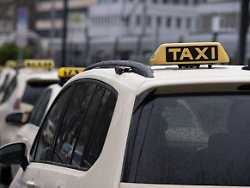“Gas prices are killing us”
Taxi industry does not come out of the permanent crisis
4/3/2022 8:14 am
The relaxation of the corona virus should actually bring about a turnaround for the taxi industry. But the sharp rise in fuel prices is thwarting the plans for a number of companies. Many companies fear for their existence because the next problems are already on the horizon.
The taxi industry in Germany continues to look to the future with great concern. Despite the extensive lifting of the corona measures and the government decision to temporarily reduce the energy tax on fuels, the Federal Association of Taxi and Rental Cars does not expect a quick turnaround. “Every day there are a number of companies that give up, that simply can’t go on anymore,” said the association’s managing director Michael Oppermann in Berlin. “Yesterday we were on the brink, today we’re one step further,” he says, describing the situation. “We don’t even know that from the oil crisis in the 1970s.” After all, the industry is already coming out of an economic dry spell.
For a long time, typical taxi rides by party-goers, tourists, trade fair visitors, business travelers or holidaymakers on their way to the airport were few and far between because of the corona pandemic. But now workshop prices and fuel costs are also at record highs. “If the minimum wage increase comes, that will be the next blow in the office,” said Oppermann. The chairman of the Berlin taxi guild, Leszek Nadolski, is also wondering how the additional costs are to be paid for. It cannot be financed from sales alone. “The gas prices are killing us,” he said.
Competition from transport service providers remains tough
For many taxi operators, the business simply no longer pays off. “Every day in Berlin one or two taxis are now canceled.” Many taxi companies feared for their existence. The development is similar across Germany: According to the Federal Association, the number of taxi companies has already fallen by a fifth to around 18,000 since the beginning of the pandemic. Oppermann expects that the development will accelerate and that it will be a third less by the end of the year.
One reason is the development at the petrol pump: the price of diesel has recently fallen again slightly, but was still over two euros per liter. Compared to the level before the start of the war in Ukraine, it has risen by around 50 cents. In March 2021, it still cost an average of 1.32 euros per liter. Diesel power is still standard in the industry. The proportion of vehicles with electric drives is still very low, and Oppermann believes that a quick conversion is unrealistic: “If you order an electric car today, you are insolvent before it is delivered,” said Oppermann. And the acquisition costs are still high.
The reduction in energy taxes by 14 cents per liter of diesel will have an impact. “It’s a step in the right direction, but it doesn’t compensate for the additional costs that we have,” criticized Oppermann. “We need some kind of additional measures, otherwise the whole calculation just doesn’t work.” Due to the far-reaching lifting of the corona measures, an improvement in the situation can be expected – for example because more people wanted to take a taxi to the airport again, said Oppermann. “But that’s just keeping us out of a crisis.” This cannot fully compensate for the decline in sales. At the same time, competition from ride-hailing service providers such as Uber remains tough.
Demand for “Putin markup”
In favor of the taxi alternative, the decision was made not least for reasons of price. But in order to cushion the cost increases, higher tariffs are indispensable from the point of view of the taxi industry. Oppermann considers an increase of 20 percent necessary. “Less because of fuel prices, especially because of the minimum wage.”
With fuel there is hope for improvement, with the statutory minimum wage permanent additional costs are certain, as the association’s managing director argues. If the increase from the current 9.82 euros per hour with an intermediate stage in July to October comes to 12 euros, from the point of view of the industry, the taxi tariffs should ideally also have been raised by then. Nobody really wants to believe that: “Tariff increases can take a good year,” complained Oppermann.
In the past few weeks, the association has therefore made a number of demands for faster solutions to federal politicians – for a “Putin price surcharge”, for example. “That could be done in the short term,” said Oppermann. “There was something like that in the oil crisis.” What is meant is a surcharge of at least one euro per trip. “I think the customers’ understanding would be there.” Paying a fixed sum – for example 100 euros – per car and week to the taxi company is not a bad idea, Oppermann points to the example of Ireland, where companies in the transport industry proceed in this way. “It would be in there if you wanted to.” In view of the rising costs, the companies simply have little room for maneuver. “Companies are calling for help,” said Oppermann. “And they feel left alone at the moment.”
